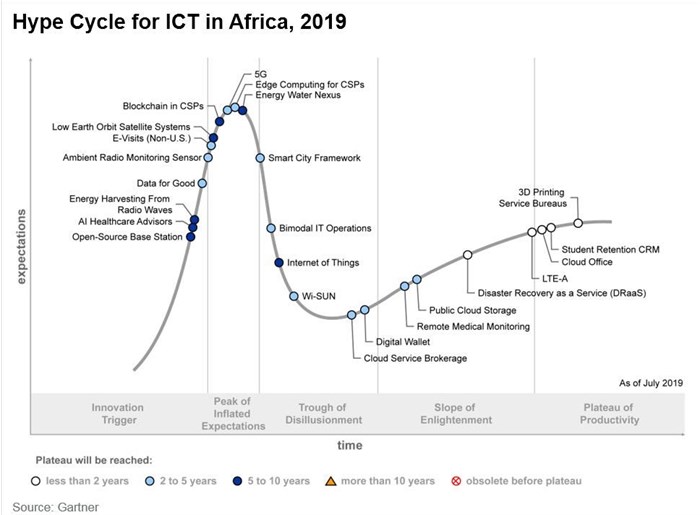Hype Cycle highlights technologies that will transform business
“IT spending continues to rise in Africa alongside the maturity of technologies locally. Seven technologies have entered the Slope of Enlightenment and are climbing toward the Plateau of Productivity in 2019," said Jeff Mann, research vice president at Gartner.
“For example, cloud office has entered the Plateau of Productivity this year. Companies in Africa have made the move to cloud because of general preference for cloud deployments, but also because of the desire to reduce costs, redeploy IT staff, drive simplicity and provide more functionality to users,” Mann added.
The Hype Cycle identifies 24 key technologies and describes how they will impact business performance in Africa during the next 10 years (see Figure 1). Thirteen of these technologies will mature within the next two to 10 years and have a transformational or high impact on businesses.

Source: Gartner (August 2019)
Technologies that will have a transformational business impact in 2-5 years
Smart cities have an intelligent urban ecosystem that is designed to improve citizens’ lives, stimulate the economy and protect the environment. A smart city framework determines the data exchange and information required to build user-ambient services and experiences.
“Smart city frameworks will have a transformational business impact in the next two to five years as cities in Africa apply diverse strategies to accelerate the development of smart city frameworks based on traffic, social and safety issues,” said Bettina Tratz-Ryan, research vice president at Gartner.
“In many countries, citizens are moving from rural areas into cities, and urbanisation strategies are key to supporting the increasing infrastructure needs, and to aid the urbanisation growth both on a demographic and business level.”
Cape Town is investing heavily in wireless communications not just as a growth engine for the city’s financial, manufacturing and tourism industries, but also to create new jobs and build an entrepreneurial base for people.
Johannesburg is using electrification, water management, traffic and green strategies to provide sustainable urban growth.
As part of its smart city/smart country strategy, Sierra Leone is planning to use a data visualisation system that collects and manages data through blockchain and other sources in order to understand rural and urban infrastructure and development trends.
“The impact of a smart city framework on businesses in Africa will be driven by the ability for public and private companies to automate and deliver better service experiences, as well as by how well citizens feel recognised in their desire to innovate their city and how safe their data will be,” says Tratz-Ryan.
Technologies that will have a transformational business impact in the next 5-10 years
The hype surrounding the IoT has decreased from the highs of 2016 through 2018. As a result, Gartner analysts have moved the position of the IoT in Africa two-thirds into the Trough of Disillusionment. IoT will reach between 5% and 20% of its local target audience and is set to have a high business impact in the next five to 10 years.
“Organisations in Africa continue to address cost, complexity and scaling challenges implementing IoT-enabled business solutions,” said Alfonso Velosa, research vice president at Gartner. “Some noticeable challenges include security concerns, end-to-end integration complexity and a large number of startup vendors that will have trouble surviving the Trough.”
The IoT is a core building block for digital business and digital platforms and regarded as a game-changing technology by CIOs in Africa. According to Gartner’s 2019 CIO Survey, 24% of CIOs in Africa ranked the IoT as a game-changer for their organisation.
While low earth orbit satellite systems are an emerging technology, they have reached the Peak of Inflated Expectations and will have a high business impact in the next five to 10 years in Africa.
“This technology is important for African countries as satellites can cover all remote or underserved geographies, providing the broadband connectivity critical to operating in remote areas in Africa," said Bill Menezes, senior principal analyst at Gartner.
Low earth orbit satellites can provide global broadband or narrowband voice and data network services to regions with little or no existing terrestrial or satellite coverage.
Organisations with current or planned business interests in remote or underserved areas in Africa should closely follow the development of these systems. They should also align narrowband and broadband connectivity requirements that cannot currently be met in targeted areas (such as backhaul from remote cellular phone towers) with emerging low earth orbit satellite technology capabilities and service availability.









































